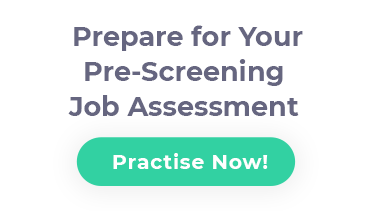Unilever Tests & Assessment Centre Preparation – 2025

What Is Unilever?
Unilever is a British-Dutch company with dual headquarters in Rotterdam, Netherlands and London, England. Unilever was founded in 1929 with the goal of making sustainable living easier. Since then, they have expanded to over 149,000 employees with offices and stores all over the world.
Unilever is one of the longest standing consumer good’s company and one of the oldest multinational corporations. It is ranked as the seventh largest company in Europe.
What Is Unilever’s Hiring Process?
Unilever employs a variety of resources to vet candidates. These include aptitude and behaviour exercises. Unilever’s goal during their hiring process is to find both a leader and a team member. Job seekers should expect the following four stages during Unilever’s recruitment process:
- Application
- Online Assessments
- Telephone Interview
- Assessment Centre
Application
Unilever has a detailed application that takes about thirty to forty-five minutes to complete. The application asks for all past education and work experience, sometimes asking for specific grades or averages. There’s an additional section with questions about the applicant’s areas of interests and hobbies outside of work.
Finally, the application has a handful of competency-based questions. These inquire about past situations and their outcomes as well as the applicant’s interest in Unilever and the role.
Unilever Online Assessments
Unilever’s online assessments mark the second stage of the interview process. They are considered to be the most difficult part of the process. The online assessments are administered to the candidate after they have submitted their application. They will receive one or more tests in their email that must be completed within three to five days.
These assessments specifically look at the candidate’s aptitude and behaviour in a workplace setting. Unilever compares the results of these tests to their outline of the ideal candidate. It should be noted that Unilever has benchmarks put into place that must be met, otherwise, the candidate will not progress past this stage.
The kind of assessment being taken depends on the role being applied for. Below is a list of all the possible assessments utilised by Unilever.
- Numerical Reasoning Test
The numerical reasoning test is a twenty-minute, multiple-choice assessment. The test taker is presented with a table or graph. From there, they must analyse the data and find the solution to the problem posed by the question. There are five answer choices per question. This test requires knowledge of data analysis, graphical interpretation, statistics, fractions and more. The assessment is adaptive, meaning the questions get progressively more difficult. There are twenty questions in total. The results inform Unilever of the candidate’s proficiency with numbers and data.
- Logical Reasoning Test
The logical reasoning assessment consists of non-verbal questions. This means that the test uses shapes rather than numbers or words. These shapes are laid out in a particular sequence with one of the shapes in the sequence missing. The objective is to find the missing shape from a list of five answer choices. The patterns are commonly depicted by changes in colour, shape, frequency, or position. The logical reasoning test evaluates the test taker’s ability to identify patterns and draw conclusions using novel or arbitrary data.
- PI Learning Indicator Test
The predictive index learning indicator test, or PI learning indicator, assesses the test taker’s capacity for learning, especially under the pressures present at the workplace. There is a total of fifty questions that are divided into four sections. These four sections include numerical, verbal, logical, and spatial reasoning skills. This assessment is typically administered to the candidates interviewing for the technical side of Unilever’s company. Test takers will have twelve minutes to complete the entire test.
- Situational Judgment Test (SJT)
The situational judgment test is a behavioural assessment that appraises the test taker’s emotional intelligence and their behaviour in the workplace. Unilever’s SJT specifically looks at decision-making, organisational and interpersonal skills, and problem-solving abilities. The questions will present a hypothetical scenario followed by a response to the situation. The test taker must rate the response based on how appropriate it was for the situation and how likely they are to have responded in the same way.
Telephone Interview
The telephone interview occurs a week or two after the online assessments have been completed. This will be a thirty to sixty-minute interview that covers all the usual interview topics such as the applicant’s resume, interest in the company, job history, etc. Unilever also expects a few questions in return.
Unilever asks a handful of competency-based questions as well as a few about the company’s values and the candidate’s relation to them. Common Unilever interview questions include:
- What do you know about Unilever?
- What is Unilever’s mission?
- How are your skills an asset to Unilever?
- Describe a time you assumed a leadership role.
- What makes you the best candidate for this role?
Unilever Assessment Centre
If the telephone interview goes well, the candidate will be invited to the assessment centre. This is the final stage of Unilever’s interview process. It occurs at one of the company’s main offices and takes anywhere from three to six hours.
At the assessment centre, about a dozen candidates convene to participate in a variety of activities. The activities one may encounter are interviews and group exercises.
The group exercises are problem-solving activities or group discussions. Each team is given a packet of information that they must discuss in order to find a solution that they all agree on. Sometimes, the groups are given a packet of information or simply a topic that they must discuss and debate amongst themselves. An assessor will sit with each group and evaluate how the candidates work with one another, their communication and leadership skills, and the role they assume in the team dynamic.
During the assessment day, there will be an interview with the senior member of the department. The interviewer will ask job-specific questions including queries about the responsibilities of the role, obstacles in the industry, and hypothetical problems that may occur.
In some cases, the candidate will also meet with a hiring manager. This interview will consist mostly of competency-based and behavioural questions. The candidate may also speak about their experience and performance at the assessment day with the hiring manager.
How to Prepare for Unilever’s Online Assessments?
Preparing for Unilever’s online assessments requires a bit of time and effort. They pose an obstacle for many candidates because they take the tests underprepared. It is easy to get flustered by the time limits and the questions if you are out of practice.
Ensuring you are well prepared isn’t too difficult of a task with the right resources. One of the best ways to practice is by using an online practice test. They simulate the testing conditions to offer you the assessment experience before you have to sit down and take them with Unilever. This allows you to navigate and get a hang of the questions with a lot less pressure. And, you will also get to see your scores at the end. This way, you can estimate how well you will do on Unilever’s online tests and how much more preparing you need to do. It is especially important to practice considering the stressful time limits. By using the practice tests, you will be able to find the pace that is right for you.
Another way to prepare is by using sample questions. The sample questions mirror those on the assessment and can act as a refresher before you go in to take the tests. Or, if you aren’t feeling comfortable with the time limits just yet, you can use the sample questions to get some practice in with the questions to improve your accuracy.
Whichever method you choose is solely up to you and what you feel will fit your needs the best. The practise tests are best if you need more experience with the time limits and the sample questions are usually best if you need more experience with the content.
The SJT is difficult to prepare for because it’s a behavioural assessment and it is supposed to be assessing your intuitive reactions to problems. However, if you wish to get a leg up, you could review the company’s values. These values will outline what Unilever believes is the ideal employee. Then, you can align your answers to these values to make yourself fit in with this outline.
Unilever‘s Interview Tips
First things first, Unilever favours a candidate that shares their values. Research these and decide what they mean to you. It is also helpful to have a few personal and professional examples of times you exhibited these values. Unilever’s company values are:
- Accountability & Responsibility
- Bias for Action
- Building Talent for Teams
- Consumer and Customer Focus
- Growth Mindset
Unilever may ask questions like “describe a time you were in a team” or “how can you have a positive impact on the people surrounding you?” Be prepared for a handful of questions about these traits
Additionally, Unilever asks a few questions about the company. It is very important to do background research about the company. This includes any obstacles they are facing or recent news about them. It is also helpful to research any current trends in your industry as these may come up in the interview.
Be prepared for the typical interview questions such as the ones below. These may be asked more than once, but both answers need to be strong and thoughtful.
- What is your five-year plan?
- What is your favourite Unilever product? Why?
- What are your strengths? Weaknesses?
Conclusion
Unilever is a big company which means some big competition. It is extremely important to devote enough time to prepare for each stage of the interview process. Best of luck!

